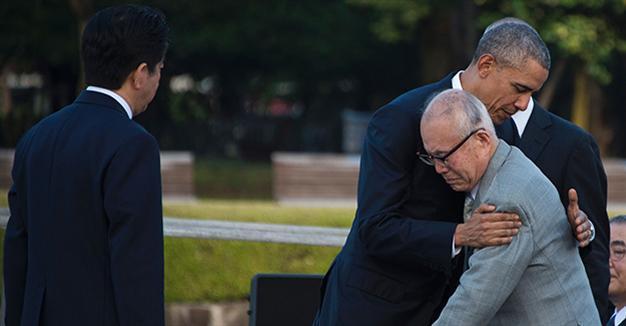In Hiroshima, Obama honors ‘silent cry’ of bombing victims
HIROSHIMA – The Associated Press

Japanese Prime Minister Shinzo Abe (L) looks on as US President Barack Obama (2nd R) hugs a survivor of the 1945 atomic bombing of Hiroshima, during a visit to the Hiroshima Peace Memorial Park on May 27, 2016
Barack Obama on May 27 paid tribute to the “silent cry” of the 140,000 people killed by the world’s first atomic bomb attack and sought to renew attention in his unfulfilled vision of a world without nuclear weapons, as he became the first sitting U.S. president to visit Hiroshima.“Death fell from the sky and the world was changed,” Obama said, after laying a wreath, closing his eyes and briefly bowing his head before an arched monument in Hiroshima’s Peace Memorial Park that honors those killed on Aug. 6, 1945, when U.S. forces dropped the bomb that ushered in the nuclear age. The bombing, Obama said, “demonstrated that mankind possessed the means to destroy itself.”
Obama did not apologize, instead offering, in a carefully choreographed display, a reflection on the horrors of war and his hope that Hiroshima would be remembered as the beginning of a “moral awakening.” As he and Japanese Prime Minister Shinzo Abe stood near an iconic bombed-out domed building, Obama acknowledged the devastating toll of war and urged the world to do better.
“We stand here in the middle of this city and force ourselves to imagine the moment the bomb fell ... we listen to a silent cry,” Obama said.
A second atomic bomb, dropped on Nagasaki three days after Hiroshima, killed 70,000 more.
Obama also sought to look forward to the day when there was less danger of nuclear war. He received a Nobel Peace Prize early on in his presidency for his anti-nuclear agenda but has since seen uneven progress.
“We must have the courage to escape the logic of fear and pursue a world without them,” Obama said of nuclear weapons.
Following the remarks, Abe called Obama’s visit courageous and long-awaited. He said it would help the suffering of survivors and echoed the anti-nuclear sentiments.
“At any place in world, this tragedy must not be repeated again,” Abe said.
The visit presented a diplomatic tightrope for a U.S. president trying to make history without ripping open old wounds.
Obama’s remarks showed a careful awareness of the sensitivities. He included both South Koreans and American prisoners of war in recounting the death toll at Hiroshima - a nod to advocates for both groups that publicly warned the president not to forget their dead.
After his remarks, he met with two survivors, but his remarks to the aging men were out of ear shot of reporters.
At one point, Obama could be seen laughing and smiling with 91-year-old Sunao Tsuboi, and he embraced Shigeaki Mori, 79, in a hug. But mostly, Obama just listened the men as they spoke through an interpreter.
Obama’s visit came as the top seven economies of the world met in Japan for their latest meeting.
A British exit from the European Union would be a serious risk to global economic growth, Group of Seven (G-7) leaders said in a summit declaration on May 27, as British Prime Minister David Cameron urged voters to “listen to our friends” on the impact of Brexit.
Brexit was not formally on the agenda at the two-day summit in Japan and despite both German Chancellor Angela Merkel and French President Francois Hollande saying the issue had not been discussed, Cameron said “one or two people” had raised it.
“A UK exit from the EU would reverse the trend towards greater global trade and investment, and the jobs they create, and is a further serious risk to growth,” G7 leaders said, in the only reference to the vote in a 32-page declaration.
Brexit was listed alongside geopolitical conflicts, terrorism and refugee flows as a potential shock of a “non-economic origin.”
















